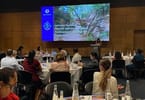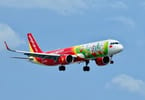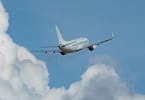PORT OF SPAIN, Trinidad and Tobago – The Association of Caribbean States (ACS) through its Directorate of Transport convened the 24th Meeting of the Special Committee for Transport on October 16, 2015 at the ACS Secretariat in Port of Spain.
The Honorable Fitzgerald Hinds, M.P., Minister of Works and Transport of Trinidad and Tobago delivered introductory remarks on behalf of his Government, and pledged to exert best efforts to ensure the continued achievements of the Special Committee of Transport.
Engineer Pedro Suarez Reyes representing Cuba in its capacity as Chair of the Special Committee for Transport stated that despite the challenges encountered in the efforts to unite the Greater Caribbean by air and sea, there continues to be motivation to improve transport in the region. This is evidenced by ACS initiatives such as: the Air and Transport Agreement, the Port and Maritime Strategy and the Maps of Maritime Routes of the Greater Caribbean.
His Excellency Alfonso Múnera, Secretary General of the ACS in his remarks stated that the ACS is currently engaged in dialogue with Avianca, Taca Airlines and Caribbean Airlines Limited with the aim of exploring possibilities to increase air connectivity throughout the Greater Caribbean Region. He mentioned that the ACS Air Services Agreement facilitated meetings on air connectivity between airlines from different countries in the region. Once connectivity is achieved, the Greater Caribbean Region will realize its full potential as a multi-destination tourism zone.
Ambassador Múnera further emphasized that the topic of maritime transport must not be neglected and that emphasis must be placed on overcoming obstacles and facilitating dialogue to promote development in this area.
Through the delivery of the Directorate’s report, Mr. George Nicholson ACS Director of Transport and Disaster Risk Reduction presented an update on activities completed over the past year, ongoing projects, new initiatives and collaborative efforts in which the Directorate is currently engaged. Director Nicolson also presented the Directorate Work Programme 2016-2017.
As detailed by this report, significant advancements were made in the following initiatives: the Port and Maritime Strategy and the Hydrographic Risk Assessment for the Greater Caribbean. The former seeks to meet the foreign trade needs of the Greater Caribbean regarding maritime-port development, taking into account the expansion of the Panama Canal while the latter intends to develop a risk assessment method which identifies the critical areas in need of hydrographic surveys.
The Director further informed that Phase 4 of the Maps of Maritime Routes of the Greater Caribbean is currently underway and will be advanced to make it self-sustainable throughout the next biennium. The web-based map identifies shipping capacity through the region, including, among other things, ports of call, agents in each country, capacity of fleet, and availability of specialized services such as refrigerated containers. This map allows exporters, importers, vendors or buyers, both internationally and regionally to know when, how, through which operators and under what conditions they may transport their goods.
One of the highlights of the Meeting was the signing of the Memorandum of Understanding (MOU) between the Port Management Association of the Caribbean (PMAC) and the ACS. This MOU aims to encourage cooperation between these two institutions to promote capacity development among the ports in the Greater Caribbean Region.
The Meeting welcomed participants from ACS Member, Associate Member and Observer Countries. Representatives from international organizations and institutions such as the Suriname Ports Management Company, the Port Managers Association of the Caribbean (PMAC), the University of the West Indies (UWI), the Economic Commission of Latin America and the Caribbean (ECLAC), the Civil Aviation Institute of Cuba, the Caribbean Community (CARICOM), the Caribbean Development Bank, the Maritime Safety, Maritime Administration Department (MARAD) of Guyana, and the Mexican Agency for International Development Cooperation (AMEXCID).
Stowarzyszenie Państw Karaibów jest organizacją zajmującą się konsultacjami, współpracą i wspólnymi działaniami w zakresie handlu, transportu, zrównoważonej turystyki i klęsk żywiołowych na Wielkich Karaibach. Jej państwa członkowskie to Antigua i Barbuda, Bahamy, Barbados, Belize, Kolumbia, Kostaryka, Kuba, Dominika, Dominikana, Salwador, Grenada, Gwatemala, Gujana, Haiti, Honduras, Meksyk, Jamajka, Nikaragua, Panama, St. Kitts i Nevis, Saint Lucia, Saint Vincent i Grenadyny, Surinam, Trynidad i Tobago oraz Wenezuela. Jej członkami stowarzyszonymi są Aruba, Curacao, Francja w imieniu (Gujana Francuska, Saint Barthélemy i Saint Martin), Gwadelupa, Martynika, Sint Maarten i Holandia w imieniu (Bonaire, Saba i Sint Eustatius).
CO WYNIEŚĆ Z TEGO ARTYKUŁU:
- Representatives from international organizations and institutions such as the Suriname Ports Management Company, the Port Managers Association of the Caribbean (PMAC), the University of the West Indies (UWI), the Economic Commission of Latin America and the Caribbean (ECLAC), the Civil Aviation Institute of Cuba, the Caribbean Community (CARICOM), the Caribbean Development Bank, the Maritime Safety, Maritime Administration Department (MARAD) of Guyana, and the Mexican Agency for International Development Cooperation (AMEXCID).
- Engineer Pedro Suarez Reyes representing Cuba in its capacity as Chair of the Special Committee for Transport stated that despite the challenges encountered in the efforts to unite the Greater Caribbean by air and sea, there continues to be motivation to improve transport in the region.
- The former seeks to meet the foreign trade needs of the Greater Caribbean regarding maritime-port development, taking into account the expansion of the Panama Canal while the latter intends to develop a risk assessment method which identifies the critical areas in need of hydrographic surveys.






















